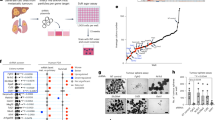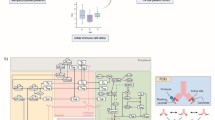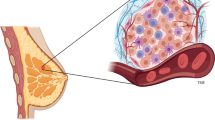Abstract
Establishing superior preclinical models is critical for translational cancer research owing to the high failure rates of novel therapeutics in clinical studies. Even though cell line-derived xenograft models are easy to create, they have numerous limitations since these models do not represent the distinctive features of each cancer patient adequately. To circumvent the discrepancies between xenograft models and tumors, patient-derived xenograft (PDX) models have been developed. These models are established through the engraftment of tissue from a patient’s tumor into an immune-deficient mouse, which preserves cell–cell interactions and tumor microenvironment. Since PDXs precisely replicate intratumoral heterogeneity, a range of chemotherapeutic agents can be tested on individual tumors. Colorectal cancer represents a unique case to demonstrate clinical perspectives revealed by PDX models since they surmount limitations of conventional ex vivo models. Even though PDX models have been associated with drawbacks with respect to prediction of clinical outcomes, they are currently the model of choice for preclinical investigations in colorectal cancer. In the current review, we provide an overview of the methodology and applications of PDX for colorectal cancer and discuss critical issues for the advancement of these models for preclinical research.
Similar content being viewed by others
References
Arnold M, Sierra MS, Laversanne M, Soerjomataram I, Jemal A, Bray F. Global patterns and trends in colorectal cancer incidence and mortality. Gut. 2017;66(4):683–91. https://doi.org/10.1136/gutjnl-2015-310912.
DeVita VT Jr, Chu E. A history of cancer chemotherapy. Cancer Res. 2008;68(21):8643–53. https://doi.org/10.1158/0008-5472.can-07-6611.
Haggar FA, Boushey RP. Colorectal cancer epidemiology: incidence, mortality, survival, and risk factors. Clin Colon Rectal Surg. 2009;22(4):191–7. https://doi.org/10.1055/s-0029-1242458.
Zhang Y, Yuan J, Zhang HY, et al. Natural resistance to apoptosis correlates with resistance to chemotherapy in colorectal cancer cells. Clin Exp Med. 2012;12(2):97–103. https://doi.org/10.1007/s10238-011-0146-5.
Abaan OD, Polley EC, Davis SR, et al. The exomes of the NCI-60 panel: a genomic resource for cancer biology and systems pharmacology. Cancer Res. 2013;73(14):4372–82. https://doi.org/10.1158/0008-5472.can-12-3342.
Hidalgo M, Amant F, Biankin AV, et al. Patient-derived xenograft models: an emerging platform for translational cancer research. Cancer Discov. 2014;4(9):998–1013. https://doi.org/10.1158/2159-8290.cd-14-0001.
Lasabova Z, Kalman M, Holubekova V, et al. Mutation analysis of POLE gene in patients with early-onset colorectal cancer revealed a rare silent variant within the endonuclease domain with potential effect on splicing. Clin Exp Med. 2019;19(3):393–400. https://doi.org/10.1007/s10238-019-00558-7.
Oh BY, Hong HK, Lee WY, Cho YB. Animal models of colorectal cancer with liver metastasis. Cancer Lett. 2017;387:114–20. https://doi.org/10.1016/j.canlet.2016.01.048.
Hood L, Flores M. A personal view on systems medicine and the emergence of proactive P4 medicine: predictive, preventive, personalized and participatory. N Biotechnol. 2012;29(6):613–24. https://doi.org/10.1016/j.nbt.2012.03.004.
Krzyszczyk P, Acevedo A, Davidoff EJ, et al. The growing role of precision and personalized medicine for cancer treatment. Technology (Singap World Sci). 2018;6(3–4):79–100. https://doi.org/10.1142/s2339547818300020.
Burney IA, Lakhtakia R. Precision medicine: where have we reached and where are we headed? Sultan Qaboos Univ Med J. 2017;17(3):e255–8. https://doi.org/10.18295/squmj.2017.17.03.001.
Byrne AT, Alferez DG, Amant F, et al. Interrogating open issues in cancer precision medicine with patient-derived xenografts. Nat Rev Cancer. 2017;17(4):254–68. https://doi.org/10.1038/nrc.2016.140.
Galimi F, Torti D, Sassi F, et al. Genetic and expression analysis of MET, MACC1, and HGF in metastatic colorectal cancer: response to met inhibition in patient xenografts and pathologic correlations. Clin Cancer Res. 2011;17(10):3146–56. https://doi.org/10.1158/1078-0432.ccr-10-3377.
Bertotti A, Migliardi G, Galimi F, et al. A molecularly annotated platform of patient-derived xenografts (“xenopatients”) identifies HER2 as an effective therapeutic target in cetuximab-resistant colorectal cancer. Cancer Discov. 2011;1(6):508–23. https://doi.org/10.1158/2159-8290.cd-11-0109.
Julien S, Merino-Trigo A, Lacroix L, et al. Characterization of a large panel of patient-derived tumor xenografts representing the clinical heterogeneity of human colorectal cancer. Clin Cancer Res. 2012;18(19):5314–28. https://doi.org/10.1158/1078-0432.ccr-12-0372.
Burgenske DM, Monsma DJ, Dylewski D, et al. Establishment of genetically diverse patient-derived xenografts of colorectal cancer. Am J Cancer Res. 2014;4(6):824–37.
Fujii M, Shimokawa M, Date S, et al. A colorectal tumor organoid library demonstrates progressive loss of niche factor requirements during tumorigenesis. Cell Stem Cell. 2016;18(6):827–38. https://doi.org/10.1016/j.stem.2016.04.003.
Yao YM, Donoho GP, Iversen PW, et al. Mouse PDX trial suggests synergy of concurrent inhibition of RAF and EGFR in colorectal cancer with BRAF or KRAS mutations. Clin Cancer Res. 2017;23(18):5547–60. https://doi.org/10.1158/1078-0432.ccr-16-3250.
Kleinman HK, Martin GR. Matrigel: basement membrane matrix with biological activity. Semin Cancer Biol. 2005;15(5):378–86. https://doi.org/10.1016/j.semcancer.2005.05.004.
Puig I, Chicote I, Tenbaum SP, et al. A personalized preclinical model to evaluate the metastatic potential of patient-derived colon cancer initiating cells. Clin Cancer Res. 2013;19(24):6787–801. https://doi.org/10.1158/1078-0432.ccr-12-1740.
Williams SA, Anderson WC, Santaguida MT, Dylla SJ. Patient-derived xenografts, the cancer stem cell paradigm, and cancer pathobiology in the 21st century. Lab Invest. 2013;93(9):970–82. https://doi.org/10.1038/labinvest.2013.92.
Fu XY, Besterman JM, Monosov A, Hoffman RM. Models of human metastatic colon cancer in nude mice orthotopically constructed by using histologically intact patient specimens. Proc Natl Acad Sci USA. 1991;88(20):9345–9. https://doi.org/10.1073/pnas.88.20.9345.
Fearon ER, Vogelstein B. A genetic model for colorectal tumorigenesis. Cell. 1990;61(5):759–67. https://doi.org/10.1016/0092-8674(90)90186-i.
Nakarai C, Osawa K, Akiyama M, et al. Expression of AKR1C3 and CNN3 as markers for detection of lymph node metastases in colorectal cancer. Clin Exp Med. 2015;15(3):333–41. https://doi.org/10.1007/s10238-014-0298-1.
Vanova B, Kalman M, Jasek K, et al. Droplet digital PCR revealed high concordance between primary tumors and lymph node metastases in multiplex screening of KRAS mutations in colorectal cancer. Clin Exp Med. 2019;19(2):219–24. https://doi.org/10.1007/s10238-019-00545-y.
Fichtner I, Slisow W, Gill J, et al. Anticancer drug response and expression of molecular markers in early-passage xenotransplanted colon carcinomas. Eur J Cancer. 2004;40(2):298–307. https://doi.org/10.1016/j.ejca.2003.10.011.
Sareeboot T, Punyarit P, Petmitr S. DNA amplification on chromosome correlated with poor prognosis in colorectal cancer. Clin Exp Med. 2011;11(2):97–103. https://doi.org/10.1007/s10238-010-0107-4.
Qiu Y, Cai G, Zhou B, et al. A distinct metabolic signature of human colorectal cancer with prognostic potential. Clin Cancer Res. 2014;20(8):2136–46. https://doi.org/10.1158/1078-0432.ccr-13-1939.
Nakatsu G, Li X, Zhou H, et al. Gut mucosal microbiome across stages of colorectal carcinogenesis. Nat Commun. 2015;6:8727. https://doi.org/10.1038/ncomms9727.
Isella C, Brundu F, Bellomo SE, et al. Selective analysis of cancer-cell intrinsic transcriptional traits defines novel clinically relevant subtypes of colorectal cancer. Nat Commun. 2017;8:15107. https://doi.org/10.1038/ncomms15107.
DeBord LC, Pathak RR, Villaneuva M, et al. The chick chorioallantoic membrane (CAM) as a versatile patient-derived xenograft (PDX) platform for precision medicine and preclinical research. Am J Cancer Res. 2018;8(8):1642.
Nunes M, Vrignaud P, Vacher S, et al. Evaluating patient-derived colorectal cancer xenografts as preclinical models by comparison with patient clinical data. Cancer Res. 2015;75(8):1560–6. https://doi.org/10.1158/0008-5472.can-14-1590.
Jung J, Seol HS, Chang S. The generation and application of patient-derived xenograft model for cancer research. Cancer Res Treat Off J Korean Cancer Assoc. 2018;50(1):1.
Maekawa H, Miyoshi H, Yamaura T, et al. A chemosensitivity study of colorectal cancer using xenografts of patient-derived tumor-initiating cells. Mol Cancer Ther. 2018;17(10):2187–96.
Teng R, Zhao J, Zhao Y, et al. Chimeric antigen receptor–modified T cells repressed solid tumors and their relapse in an established patient-derived colon carcinoma xenograft model. J Immunother. 2019;42(2):33.
Prasetyanti PR, van Hooff SR, van Herwaarden T, et al. Capturing colorectal cancer inter-tumor heterogeneity in patient-derived xenograft (PDX) models. Int J Cancer. 2019;144(2):366–71.
Yu SM, Jung S-H, Chung Y-J. Comparison of the genetic alterations between primary colorectal cancers and their corresponding patient-derived xenograft tissues. Genomics Inform. 2018;16(2):30.
De La Rochere P, Guil-Luna S, Decaudin D, Azar G, Sidhu SS, Piaggio E. Humanized mice for the study of immuno-oncology. Trends Immunol. 2018;39(9):748–63. https://doi.org/10.1016/j.it.2018.07.001.
Jespersen H, Lindberg MF, Donia M, et al. Clinical responses to adoptive T-cell transfer can be modeled in an autologous immune-humanized mouse model. Nat Commun. 2017;8(1):707. https://doi.org/10.1038/s41467-017-00786-z.
Corcoran RB, Atreya CE, Falchook GS, et al. Combined BRAF and MEK inhibition with dabrafenib and trametinib in BRAF V600-mutant colorectal cancer. J Clin Oncol Off J Am Soc Clin Oncol. 2015;33(34):4023–31. https://doi.org/10.1200/JCO.2015.63.2471.
Malaney P, Nicosia SV, Davé V. One mouse, one patient paradigm: new avatars of personalized cancer therapy. Cancer Lett. 2014;344(1):1–12. https://doi.org/10.1016/j.canlet.2013.10.010.
Kopetz S, Desai J, Chan E, et al. Phase II pilot study of vemurafenib in patients with metastatic BRAF-mutated colorectal cancer. J Clin Oncol. 2015;33(34):4032–8. https://doi.org/10.1200/jco.2015.63.2497.
Gao H, Korn JM, Ferretti S, et al. High-throughput screening using patient-derived tumor xenografts to predict clinical trial drug response. Nat Med. 2015;21(11):1318–25. https://doi.org/10.1038/nm.3954.
Lancaster MA, Knoblich JA. Organogenesis in a dish: modeling development and disease using organoid technologies. Science. 2014;345(6194):1247125. https://doi.org/10.1126/science.1247125.
van de Wetering M, Francies HE, Francis JM, et al. Prospective derivation of a living organoid biobank of colorectal cancer patients. Cell. 2015;161(4):933–45. https://doi.org/10.1016/j.cell.2015.03.053.
Yang H, Sun L, Liu M, Mao Y. Patient-derived organoids: a promising model for personalized cancer treatment. Oxford: Oxford University Press; 2018.
Vlachogiannis G, Hedayat S, Vatsiou A, et al. Patient-derived organoids model treatment response of metastatic gastrointestinal cancers. Science. 2018;359(6378):920–6.
Acknowledgements
This work was supported by Zhejiang Provincial Science and Technology Projects (Nos. 2017C37159 to YL)
Author information
Authors and Affiliations
Corresponding author
Ethics declarations
Conflict of interest
The authors declare that they have no conflict of interest.
Additional information
Publisher's Note
Springer Nature remains neutral with regard to jurisdictional claims in published maps and institutional affiliations.
Rights and permissions
About this article
Cite this article
Xie, J., Lin, Y. Patient-derived xenograft models for personalized medicine in colorectal cancer. Clin Exp Med 20, 167–172 (2020). https://doi.org/10.1007/s10238-020-00609-4
Received:
Accepted:
Published:
Issue Date:
DOI: https://doi.org/10.1007/s10238-020-00609-4




